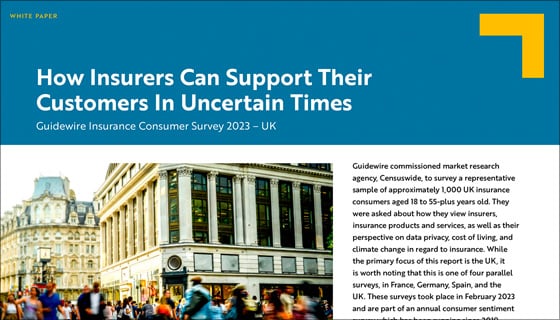
Guidewire (NYSE: GWRE) today released the latest edition of its annual study on insurance customers and their attitudes towards insurers and insurance innovation. The report, How Insurers Can Support Their Customers in Uncertain Times, shows how consumer insurance choices are being affected by factors such as the cost of living, new technology, and data privacy.
Guidewire commissioned market research agency, Censuswide, to survey approximately 1,000 UK insurance consumers aged 18 to 55-plus years old. This study was undertaken in parallel with research in France, Germany and Spain. All surveys took place in February 2023 and are part of an annual insurance customer sentiment study, running over the last four years.
The research suggests insurers can appeal to the needs of their younger insurance customers through usage-based insurance (UBI) models. While the number of people in the UK who have a UBI policy (14 percent) has only increased 2 percent in 2023, there has been a greater shift in this direction amongst younger consumers. UBI use has grown by 5 percent for those aged 35-44 years, whilst the number of 18–24-year-olds with a UBI policy has increased 13 percent. Amongst those that do have a UBI policy, 35 percent say that they chose one because of the higher cost of traditional cover.
Other key findings are:\_
Stop Damage Happening in the First Place - There is an appetite from customers for more proactive and preventative services from insurers. Two thirds (66 percent) of those surveyed in the UK said that they would want access to services that warned them of potential damage before it happened, a 6 percent increase on 2022 results. Interest across Europe is even higher, particularly in Germany (79 percent) and Spain (82 percent).
Big Tech Competition Waning? - Insurers still need to be aware of competition from outsiders but their appeal to customers shows signs of declining. Nearly four in ten (39 percent) UK consumers said they would be comfortable buying their insurance from companies such as Tesla, IKEA, or Amazon. It should be noted this represents a 6 percent drop against 2022. UK insurance consumers were also asked whether they would use the new Amazon Insurance Store available in the market. Three in ten (30 percent) said that they would use it, whilst a further 30 percent responded that Amazon is a trusted brand and so see no reason not to use it. However, 17 percent said that they would be concerned with Amazon having more data on them and so may not use it, whilst 13 percent answered that they would not use it at all.
You Can Use My Data But … - Data privacy has emerged as a clear dividing line as to whether people will select insurance services or products. More people are comfortable with data use in insurance, with the number of people who do not understand why insurers would use sensor telemetry for insurance purposes (18 percent) having dropped by 10 percent in the last year. When asked what kind of data UK consumers are most comfortable with insurers collecting for insurance purposes, real-time data on home plumbing systems to detect leaks (24 percent) and data to monitor home heating systems for problems (22 percent) are the top choices. The biggest year-to-year change relates to real-time location tracking of possessions, which has risen from 14 percent in 2022 to 19 percent this year. Looking across all markets, those that do not want insurers to collect data even if it benefits them are also the least likely to use a chatbot to speak to their insurer or choose an embedded insurance offering.
René Schoenauer, product marketing director - EMEA, Guidewire, said, “Trust around how insurers use customer data is essential to innovation and change in the industry. But data processing is often criticised because people feel they and their behaviours are being treated like a commodity. Insurers can really remedy this misunderstanding and should highlight how smarter, sensitive use of data equals better pricing, flexible personalised coverage, and even services that prevent damage and loss happening in the first place. Our study again supports how the industry can set itself apart from others in how good data analytics can have a positive impact on people’s lives.”
The 2023 report has found that four in ten (42 percent) consumers are still considering whether to reduce their spending on insurance. In 2023, home contents insurance is the most likely cover to be cancelled, overtaking travel insurance which led in 2022. This is being driven largely by younger consumers, with over a quarter (28 percent) of those aged 25-34 years and one in four (25 percent) of those aged 18-24 saying that they would cut spending on home contents insurance. By contrast older groups are less likely to cut insurance spending with almost three out of four (73%) of over 55s saying it was unlikely they would make a reduction.
“That the cost-of-living is still top of mind for many is hardly a surprise given the economic outlook. What is striking is that while younger people would consider cancelling their home contents insurance, older customers do not want to reduce their spending on insurance despite financial pressures,” continues Schoenauer. “Given that the financial situation may remain difficult for householders for some time, this suggests insurers need to develop and deliver new, flexible usage-based offerings to their customers as quickly as they are able to. These should be available for selected, important possessions, or provide protection for specific damages. It is exactly this kind of innovation that will show insurance customers that their insurers continue to understand their needs and that they are there to support them no matter what challenges they face.”